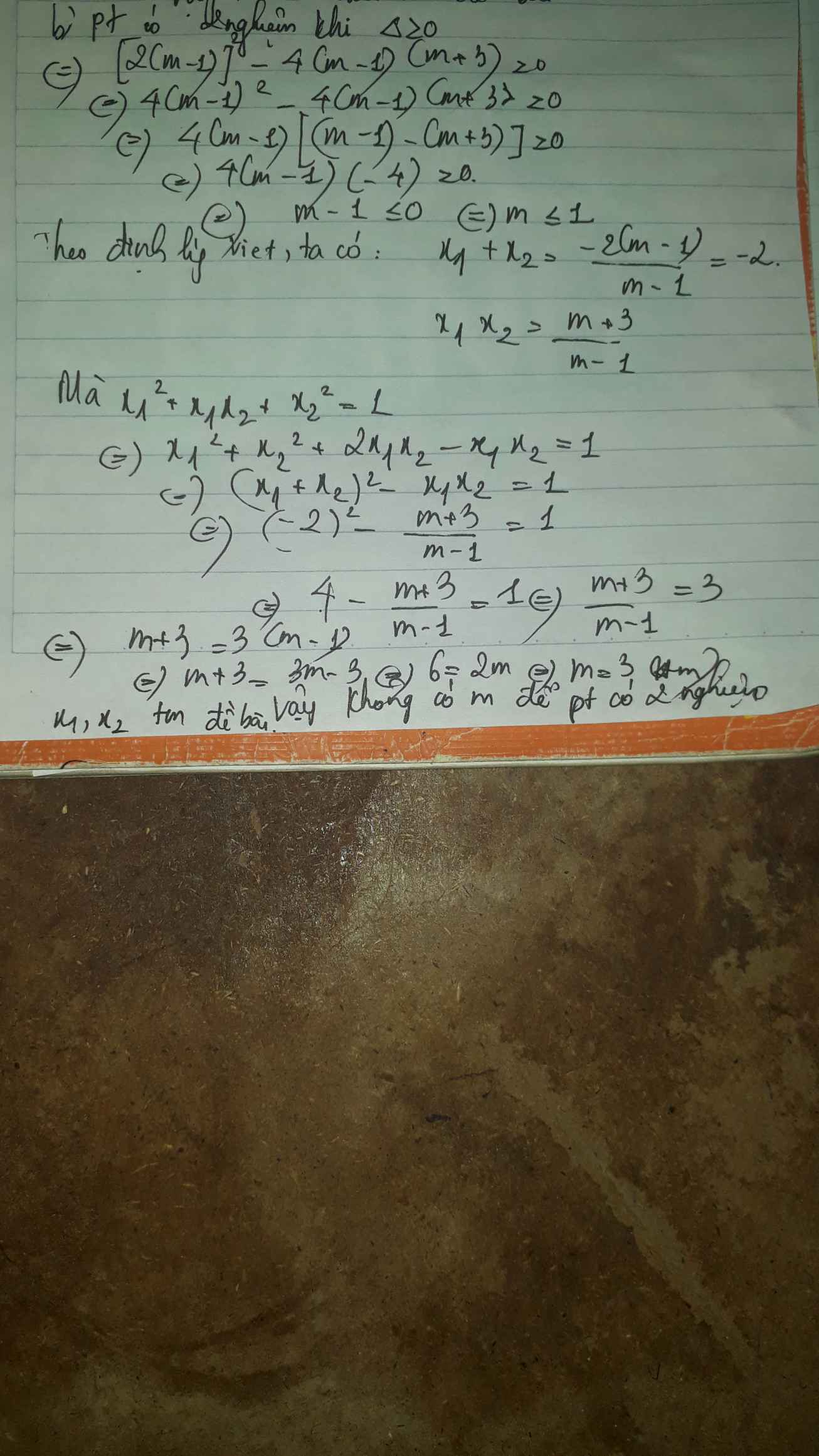Hãy nhập câu hỏi của bạn vào đây, nếu là tài khoản VIP, bạn sẽ được ưu tiên trả lời.

\(8x^2-8x+m^2+1=0\) ( 1 )
\(\Delta'=16-8\left(m^2+1\right)=16-8m^2-8=8-8m^2\)
PT ( 1 ) có hai nghiệm x1,x2 \(\Leftrightarrow\Delta'=8-8m^2\ge0\)\(\Leftrightarrow m^2\le1\Leftrightarrow-1\le m\le1\)
Áp dụng hệ thức Vi-ét, ta có :
\(\hept{\begin{cases}x_1+x_2=1\\x_1x_2=\frac{m^2+1}{8}\end{cases}}\)
Do đó : \(x_1^4-x_2^4=x_1^3-x_2^3\)
\(\Leftrightarrow x_1^4-x_1^3=x_2^4-x_2^3\)
\(\Leftrightarrow x_1^3\left(x_1-1\right)-x_2^3\left(x_2-1\right)=0\Leftrightarrow-x_1^3x_2+x_2^3x_1=0\)
\(\Leftrightarrow x_1x_2\left(x_1^2-x_2^2\right)=0\Leftrightarrow x_1x_2\left(x_1-x_2\right)\left(x_1+x_2\right)=0\)
Dễ thấy \(x_1x_2=\frac{m^2+1}{8}>0;x_1+x_2=1>0\)nên \(x_1-x_2=0\Leftrightarrow x_1=x_2\)
Từ đó tìm được \(m=\pm1\)

Ta có \(\Delta'=4^2-8\left(m^2+1\right)=-8m^2+8\)
Để pt có nghiệm thì \(-8m^2+8\ge0\Leftrightarrow8m^2\le8\Leftrightarrow-1\le m\le1\)
Nếu x1=x2 thì ( bạn tự làm nhé ! )
Nếu x1 \(\ne\) x2 thì ta có:
\(\left(x_1-x_2\right)\left(x_1+x_2\right)\left(x_1^2+x_2^2\right)=\left(x_1-x_2\right)\left(x_1^2+x_1x_2+x_2^2\right)\)
\(\Leftrightarrow\left(x_1+x_2\right)\left[\left(x_1+x_2\right)^2-2x_1x_2\right]=\left(x_1+x_2\right)^2-x_1x_2\)
Mặt khác theo định lý Viete ta có:\(x_1+x_2=1;x_1x_2=\frac{m^2+1}{8}\)
\(\Rightarrow1-\frac{m^2+1}{4}=1-\frac{m^2+1}{8}\)
\(\Rightarrow\frac{m^2+1}{4}=\frac{m^2+1}{8}\)
Bạn check giúp mik nhé,không biết có nhầm đâu ko nữa

Δ=(m+2)^2-4*2m=(m-2)^2
Để PT có hai nghiệm pb thì m-2<>0
=>m<>2
\(\dfrac{1}{x_1}+\dfrac{1}{x_2}=\dfrac{x_1x_2}{4}\)
=>\(\dfrac{x_1+x_2}{x_1x_2}=\dfrac{x_1x_2}{4}\)
=>\(\dfrac{m+2}{2m}=\dfrac{2m}{4}=\dfrac{m}{2}\)
=>2m^2=2m+4
=>m^2-m-2=0
=>m=2(loại) hoặc m=-1

b) phương trình có 2 nghiệm \(\Leftrightarrow\Delta'\ge0\)
\(\Leftrightarrow\left(m-1\right)^2-\left(m-1\right)\left(m+3\right)\ge0\)
\(\Leftrightarrow m^2-2m+1-m^2-3m+m+3\ge0\)
\(\Leftrightarrow-4m+4\ge0\)
\(\Leftrightarrow m\le1\)
Ta có: \(x_1^2+x_1x_2+x_2^2=1\)
\(\Leftrightarrow\left(x_1+x_2\right)^2-2x_1x_2=1\)
Theo viet: \(\left\{{}\begin{matrix}x_1+x_2=-\dfrac{b}{a}=2\left(m-1\right)\\x_1x_2=\dfrac{c}{a}=m+3\end{matrix}\right.\)
\(\Leftrightarrow\left[-2\left(m-1\right)^2\right]-2\left(m+3\right)=1\)
\(\Leftrightarrow4m^2-8m+4-2m-6-1=0\)
\(\Leftrightarrow4m^2-10m-3=0\)
\(\Leftrightarrow\left[{}\begin{matrix}m_1=\dfrac{5+\sqrt{37}}{4}\left(ktm\right)\\m_2=\dfrac{5-\sqrt{37}}{4}\left(tm\right)\end{matrix}\right.\Rightarrow m=\dfrac{5-\sqrt{37}}{4}\)

a: Thay m=-5 vào (1), ta được:
\(x^2+2\left(-5+1\right)x-5-4=0\)
\(\Leftrightarrow x^2-8x-9=0\)
=>(x-9)(x+1)=0
=>x=9 hoặc x=-1
b: \(\text{Δ}=\left(2m+2\right)^2-4\left(m-4\right)=4m^2+8m+4-4m+16=4m^2+4m+20>0\)
Do đó: Phương trình luôn có hai nghiệm phân biệt
\(\dfrac{x_1}{x_2}+\dfrac{x_2}{x_1}=-3\)
\(\Leftrightarrow x_1^2+x_2^2=-3x_1x_2\)
\(\Leftrightarrow\left(x_1+x_2\right)^2+x_1x_2=0\)
\(\Leftrightarrow\left(2m+2\right)^2+m-4=0\)
\(\Leftrightarrow4m^2+9m=0\)
=>m(4m+9)=0
=>m=0 hoặc m=-9/4

a: Thay m=3 vào pt, ta được:
\(x^2-4x-1=0\)
\(\Leftrightarrow\left(x-2\right)^2=5\)
hay \(\left[{}\begin{matrix}x=\sqrt{5}+2\\x=-\sqrt{5}+2\end{matrix}\right.\)
b: \(\text{Δ}=\left(-4\right)^2-4\left(-2m+5\right)\)
\(=16+8m-20=8m-4\)
Để phương trình có hai nghiệm thì 8m-4>=0
hay m>=1/2
Theo đề, ta có: \(\left(x_1+x_2\right)^2+3x_1x_2-3\left(x_1+x_2\right)=0\)
\(\Leftrightarrow4^2-3\cdot4+3\left(-2m+5\right)=0\)
\(\Leftrightarrow4-6m+15=0\)
=>-6m+19=0
hay m=19/6(nhận)

Lời giải:
Để pt có 2 nghiệm thì:
$\Delta'=(m+1)^2-(m^2+m-1)\geq 0$
$\Leftrightarrow m+2\geq 0\Leftrightarrow m\geq -2$
Áp dụng định lý Viet, với $x_1,x_2$ là nghiệm của pt thì ta có:
$x_1+x_2=2(m+1)$
$x_1x_2=m^2+m-1$
Khi đó:
$\frac{1}{x_1}+\frac{1}{x_2}=4$
$\Leftrightarrow \frac{x_1+x_2}{x_1x_2}=4$
$\Leftrightarrow \frac{2(m+1)}{m^2+m-1}=4$
$\Rightarrow 2m^2+m-3=0$
$\Leftrightarrow (m-1)(2m+3)=0$
$\Leftrightarrow m=1$ hoặc $m=\frac{-3}{2}$ (đều thỏa mãn)
